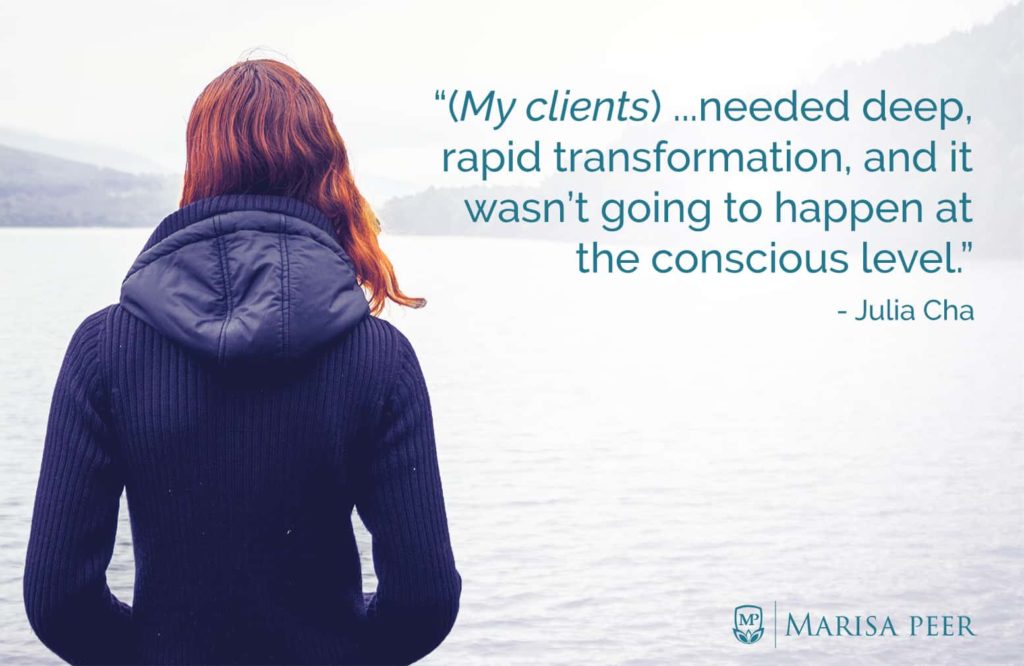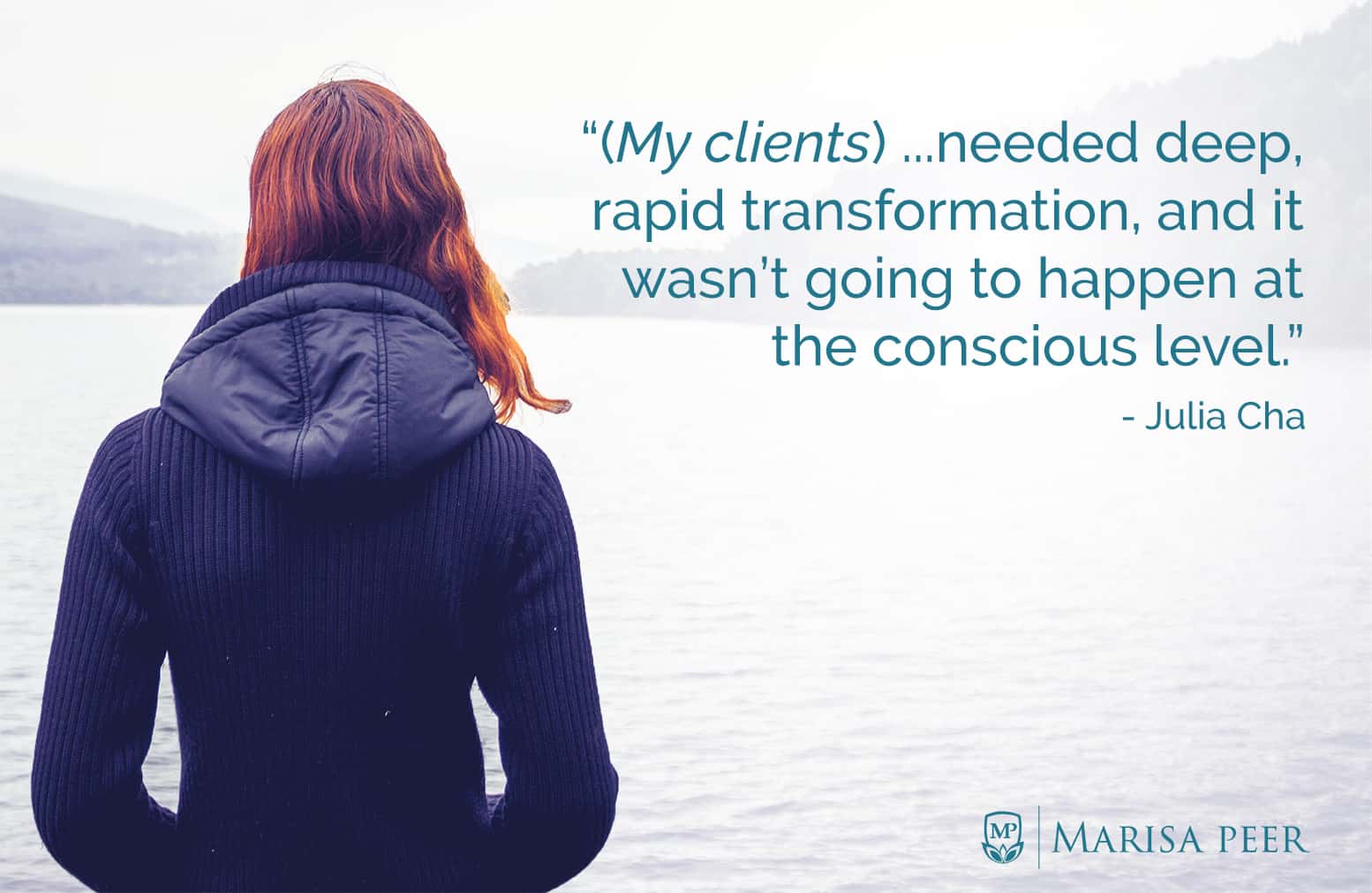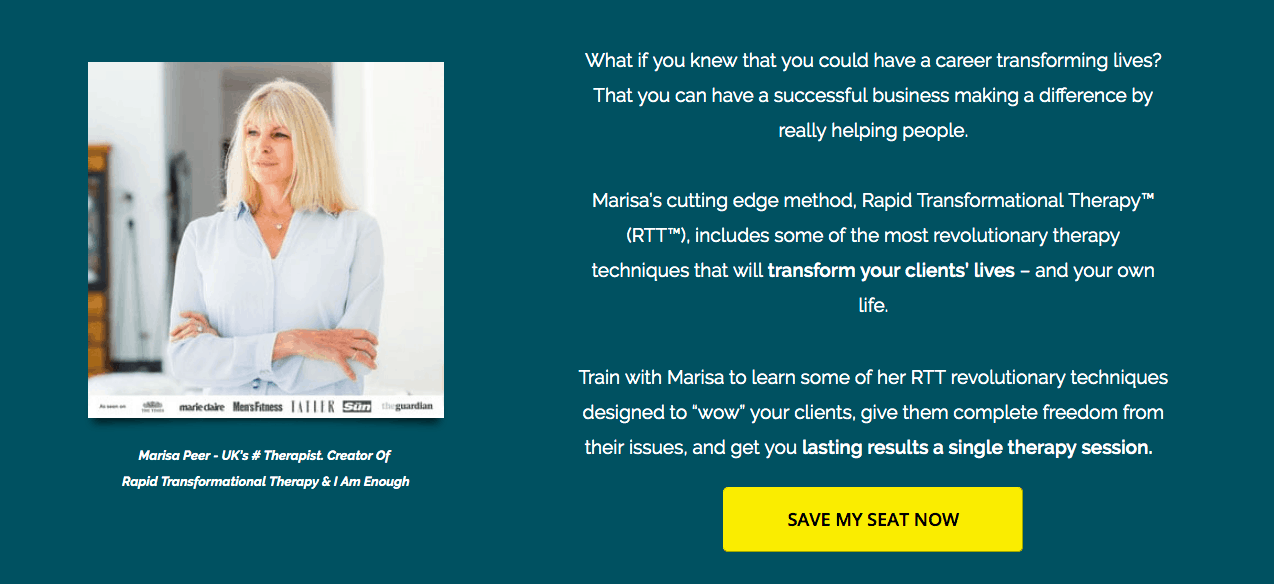Julia Cha is a Rapid Transformational therapist and coach who works with executives and entrepreneurs “building a life of legacy, work-life integration, and phenomenal joy.”
However it wasn’t always easy for Julia and she had to overcome her own personal issues, plus family and societal expectations, to become the “woman and role model” she so desperately wanted.
Find out how Julia Cha broke free from traditional expectations, using RTT to take coaching clients to the next level of personal and professional transformation.
Please, can you tell us a little about your life before RTT, what were your biggest challenges? What were you struggling to overcome? What was it costing you, what pain was it causing you? How did this impact your life?
Before RTT, I was a coach working with entrepreneurs and their business problems… which are always tied to the business owner’s personal issues. Like most coaches, I was attempting to help my clients through conscious level coaching. They got great results, but I saw that it was a slow process. I could see that we were just scratching the surface and dealing with the symptoms.
There were two major issues I struggled with as a coach who was so committed to my clients and their results. I wanted to give them real-life and business transformation. I wanted it to be rapid, permanent, and I also wanted to resolve the root cause, so they don’t struggle to keep the change, and/or regress back to their old problems when the coaching relationship ends.
My biggest pain came when one of my clients, a consultant that I helped take from nothing to 6-figures, couldn’t maintain her success and crashed and burned when we ended our coaching relationship. She struggled so much with her original issues, including her mindset around money and issues around relationships (family relationships play out similarly in business relationships because what a relationship is like is always about how we are).
I wanted to crawl back into a cave and cry (I did cry… a lot) and really questioned my abilities and what I was actually helping my clients achieve. I thought I had found my calling and my purpose, but seeing my own skillset limitation, I felt a deep sense of not being a good enough coach. It is tremendously painful to feel like a failure in your life purpose.
How did you discover RTT? Why did you decide to try it?
I was already identifying root causes in my coaching practice by getting the client to close their eyes and locate the origins of the same feelings in the past. I learned this from another therapist. It was effective to a certain extent, but it didn’t fully access their subconscious. It was very much on the conscious level.
I knew what my clients needed. They needed deep, rapid transformation, and it wasn’t going to happen at the conscious level. I longed to find the right methods to study, to access the subconscious and effectively find the root cause and eradicate it.
I found out about Marisa Peer through a friend. I watched her talks but I was not aware of her methods. It took more than a year to realize that the method I had been searching for is Rapid Transformational Therapy (RTT). RTT resonated deeply with the work I already believed in and I knew it was THE best method for my clients, to give them the rapid, permanent results I was so committed to.
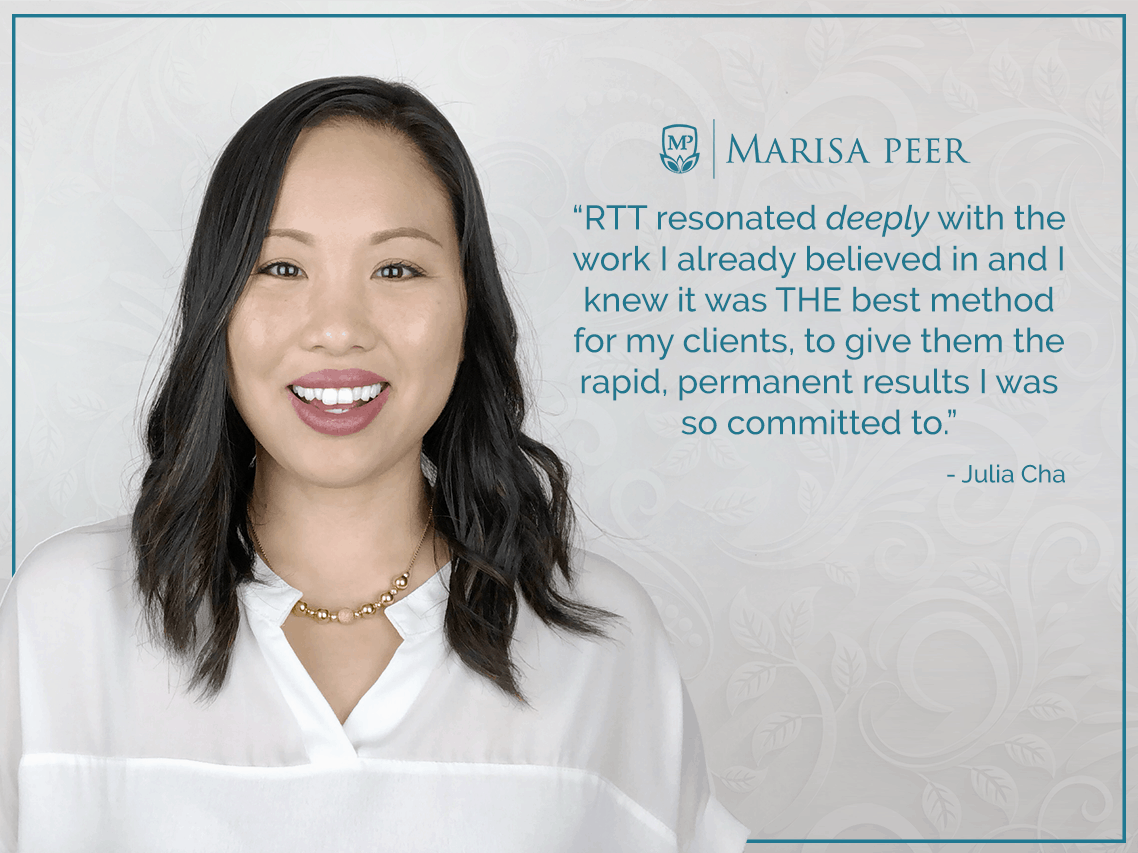
What did you most want to achieve from RTT? If you had a magic wand, what did you wish to change?
With RTT, I wanted the best results for my clients. But before that, I also knew that those results don’t just happen without doing my own work. I’m a strong believer that a coach can take a client as far as the mindset level of the coach themselves.
I really needed to overcome some of my deep issues with not deserving professional success. I’ve been conditioned to only excel as a mom, and that has been the expectation of a woman for many generations in my family. I fought with this conditioning all my working life.
There was never a role model in my life of a woman who was successful, had a lot of assets, and built a career, without the help of her husband or father. And to do this outside of what is known as a “conventional” path without being involved in a corporation or academia was what I really wanted, but also was completely unknown to me.
I needed to overcome deep shame around becoming a successful female entrepreneur on my terms, even if that meant jeopardizing existing relationships with people in my life who would feel uncomfortable with me in that role. There was certainly a lot of “I’m not enough” to overcome, around earnings, status, having and using my voice, and fully being comfortable becoming the woman and the kind of role model I always wished to have.
My practice has flourished so much since the days before RTT. I have excellent executive and C-suite level clients, as well as entrepreneurs. I have a thriving, consistently fully-booked coaching practice, helping my clients achieve their highest level of success, on their terms. I’m truly living my life purpose and as I partner with my clients they live theirs too.
What was your experience of RTT? How many sessions did you have, did you listen to an audio recording and how did you find it?
I had many sessions that I can’t count them all. I always listened to my recordings at least once a day, and I found RTT to be the most effective form of therapy. Every day I’m very happy that I invested in my career in honing and perfecting the techniques because it works like magic. I believe in it so much that I don’t just practice it, I like to get a session for myself from another accomplished therapist, every month.
How did this help? How do you feel now as a result of RTT? How has your life changed? How does this relate to what you most wanted?
I can say that because of RTT, I’ve become unapologetic at filtering out beliefs, environments, and people that don’t serve my purpose. I believe this is really hard for many women. Even strong, accomplished women have a hard time saying “no” when they need to.
I am now the ideal role model version of myself that I dreamed of, and I continue to expand. Becoming extraordinarily self-aware means that I am also really good at identifying opportunities and where I put my time and energy. Some of the greatest gifts from RTT have been that it’s really helped me become good at opening up and being myself, being genuinely confident and believing that I do deserve everything that I desire in my heart. If I can picture it, I can have it.
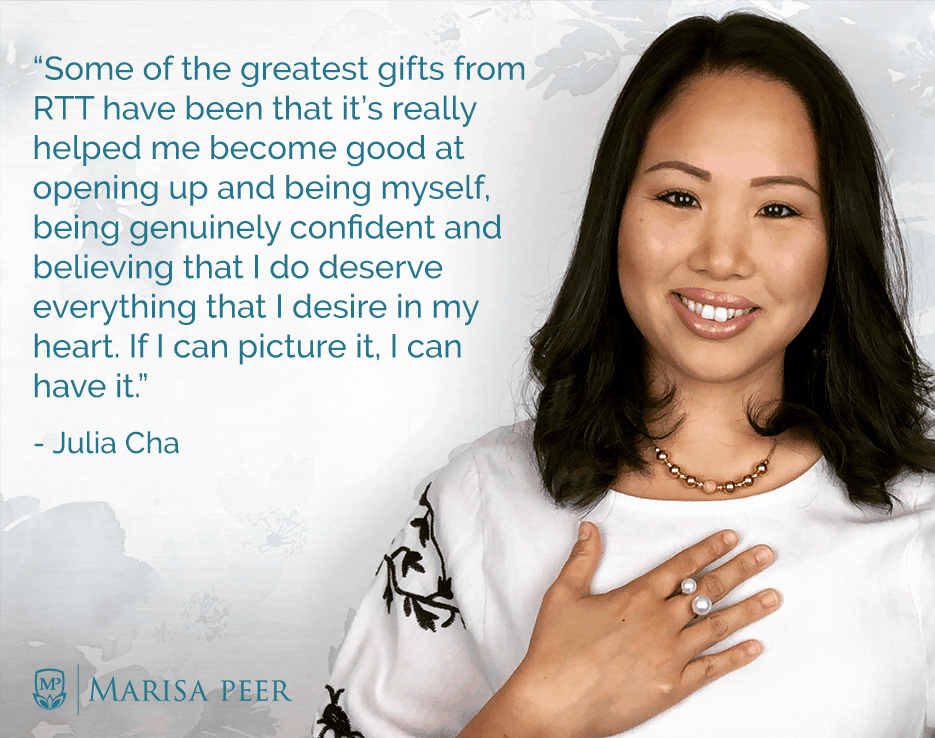
How is RTT different from other approaches you have tried?
I started traditional therapy at 18 and I’ve been invested in my own personal growth since then. I’ve had over 15 years of traditional therapy, with countless therapists with various (high) credentials. I also received another form of hypnotherapy. I’ve received countless conscious level coaching. I’ve also studied psychology at university, read many books on the brain, habits, and self-development. RTT takes the best of everything and is structured in the most comprehensive format to get the fastest, most effective results. I believe this is because none of the other methods are able to effectively locate the root cause of the issue, and treat it the way RTT does.
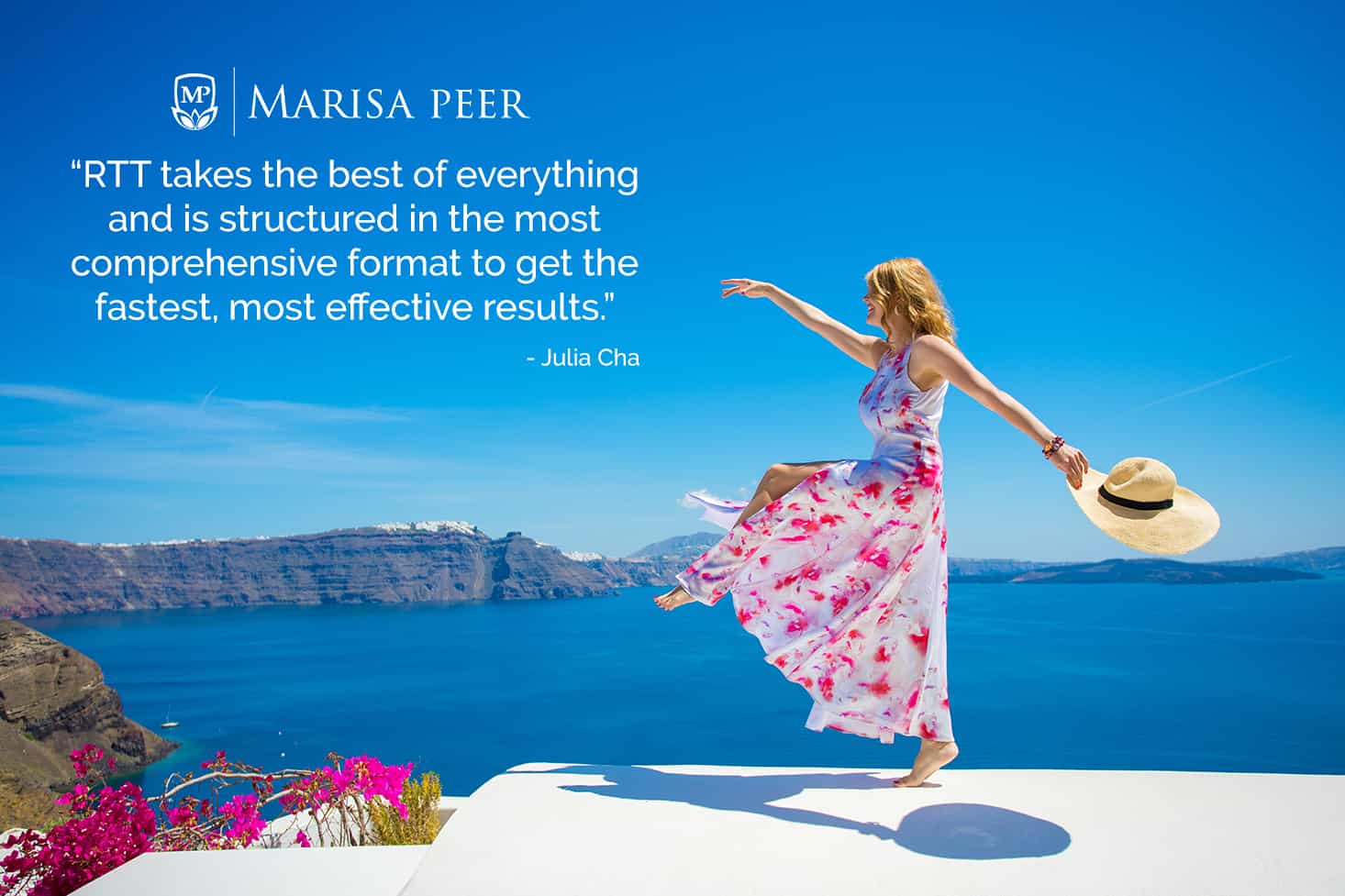
Marisa Peer says that transformation can be immediate, cumulative, or retrospective – when you look back now, what would you say was your experience?
I have experienced all forms of transformation, and there is really no way to predict this. What I do believe is that every session instills in the individual parts of immediate, cumulative, and retrospective transformation. Only when we become really introspective and give time, we can really see how much we’ve changed. Different issues have different change levels, and that varies from person to person. To have exponential results, we have to be kind to ourselves and give a lot of patience. Enjoy the immediate transformations, which there are plenty, and celebrate the cumulative and retrospective transformations. Even when we can’t see or feel the transformation, it’s already started ramping up, and we see just how deep these transformations reach. We are exactly where we need to be, and every phase is important. Immediate transformations are great because it gives us affirmation. We feel lighter, happier, and suddenly see differently. Cumulative and retrospective transformations are just as important because it adds yet another layer in deep transformation. Slow and steady does win the race.
Anything else you would like to share?
I’d like to say to those who really desire a better life and to be a better version of themselves… to never wait, because if you are still contemplating, that means you wish you started yesterday. The fantastic results we see in other people started when they were unsure. Uncertainty will always be there. Certainty is something we create within ourselves. When we change, a whole world of possibilities lines up right before us.
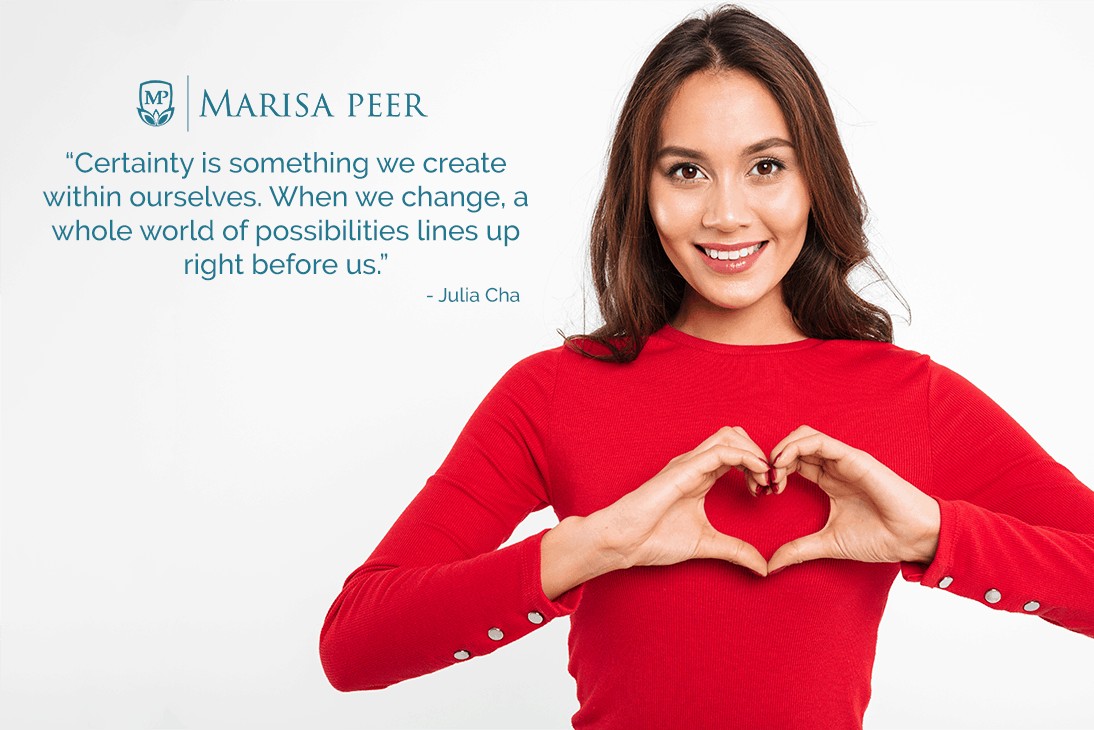
You too can train in RTT and enjoy a career transforming lives…
If you would like to find out more about how to train in Rapid Transformational Therapy (RTT) and have a successful career transforming lives then please visit https://rapidtransformationaltherapy.com/
Join Marisa Peer’s free Masterclass to discover The Five BREAKTHROUGH Tips To Help You Become A World-Class Therapist.
Thank You for sharing your story and bringing your RTT experience to life…
Julia Cha.

If You Have a Story to Share…
We love to hear your real-life stories of how RTT has impacted you or your clients’ lives. If you would like to share your experience with the wider community, so as many people can benefit as possible, please email support@marisapeer.com.

